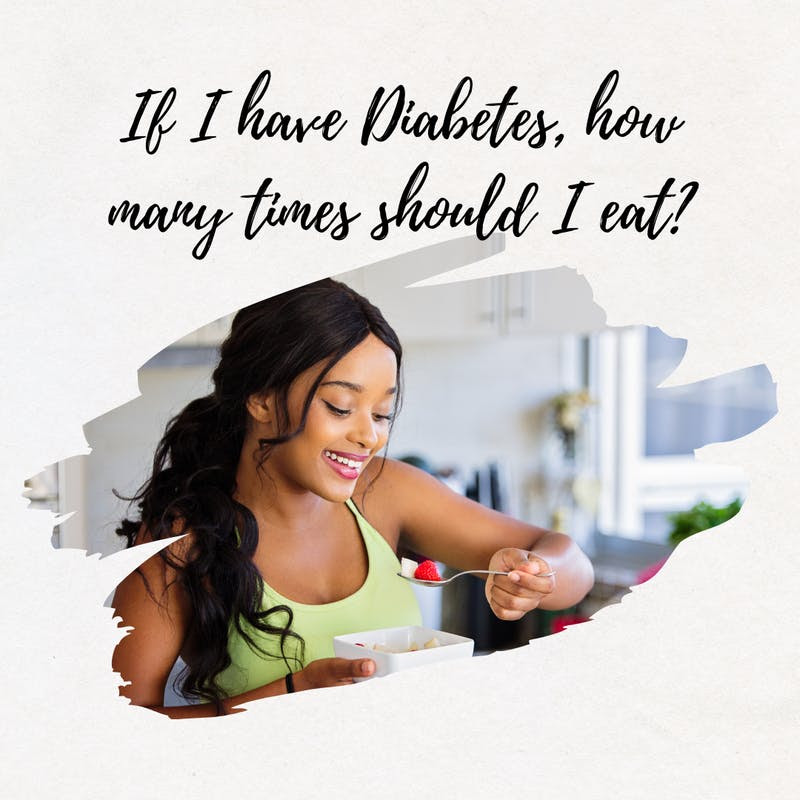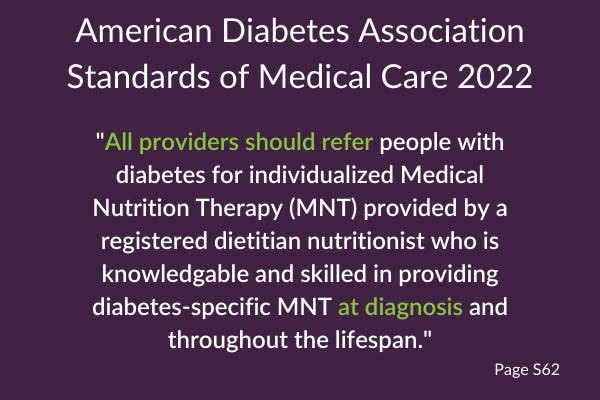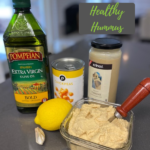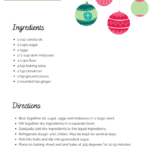Have you heard that people with diabetes should eat six times a day?
It is true that small frequent feedings can help your glucose from going too high or low. It is a common bit of advice given by health care professionals and misinterpreted as “mandatory” by many people. It’s not bad advice. However, it’s not the only good advice.

Did you know that the American Diabetes Association Standards of Medical Care state that a person with diabetes should be referred to a registered dietitian nutritionist knowledgeable about diabetes when they are diagnosed and then as needed throughout the patient’s lifespan?

Too often, this does not happen. Instead people are given vague one-liners. “Watch your carbs.” “Lose weight.” “Don’t eat anything white.” “Eat 6 small feedings a day.”
A proper referral to a qualified dietitian can reduce unnecessary stress with the help of an individualized meal plan that works with your schedule and preferences.
I am a dietitian who tailors each nutrition plan to the specific individual.
I always work the nutrition plan into the persons’ lifestyle and preferences. I do a nutrition assessment, and ask a lot of questions. I learn a lot about you in my initial meetings, so without answers to my strategic questions I can’t give specialized, specific advice. (And neither can anyone else).
So how many times should people with diabetes eat?
It depends. Let’s explore these questions:
What do you prefer? Do you like eating small feedings throughout the day? Or do you prefer three meals and nothing in between? Or perhaps three meals and an afternoon snack?
Other things to consider–
- How far apart are your meals?
- Do you get everything you need in your meals or do you need a snack to fill the gap in the nutrients you’re missing?
- Are your glucose levels in target?
Everyone is different. There are lots of times 3 meals a day work well. Six small feedings a day works for some. Others might have 1-2 snacks and 3 meals.
You do not need to figure this out on your own!
Registered dietitians who specialize in diabetes have the expertise to tailor a plan with you.
In fact, medical nutrition therapy delivered by a registered dietitian nutritionist is associated with an A1C decrease of 1 to 2%. That is as effective as many diabetes medications.
If your healthcare provider has not referred you to a dietitian, ask to see one.
If you live in Florida (where I’m licensed) I would be happy to work with you. Contact me to find out more. Outside of Florida you can find a dietitian in your area here.
There is not a certain number of times to eat that is right for everyone.
- It is a Standard of Care to be referred to it registered dietitian (RD or RDN) when you are diagnosed with diabetes and again as needed throughout the lifespan.
- Seeing a registered dietitian nutritionist is associated with a decrease in A1C of 1 to 2%.
- A tailored plan takes the guesswork out of when and how much to eat. Your preferences and goals are at the center of the plan.
- Speak up and ask your healthcare provider for a referral to a dietitian if you have not seen one. We make things easier and never take your favorite food away.






Leave a Reply